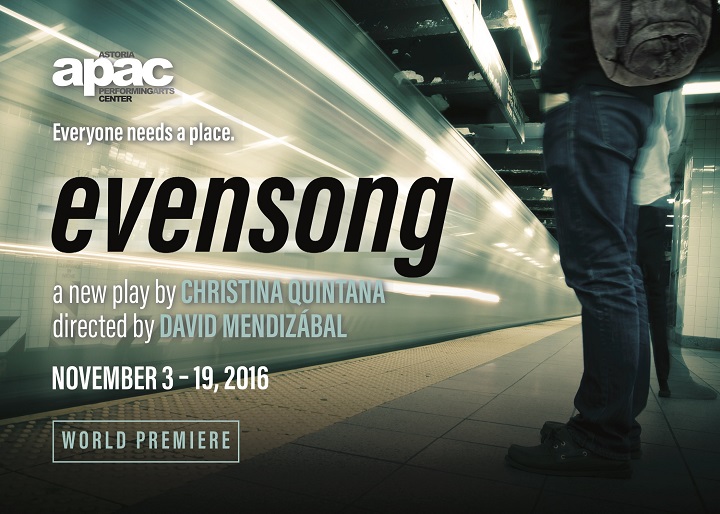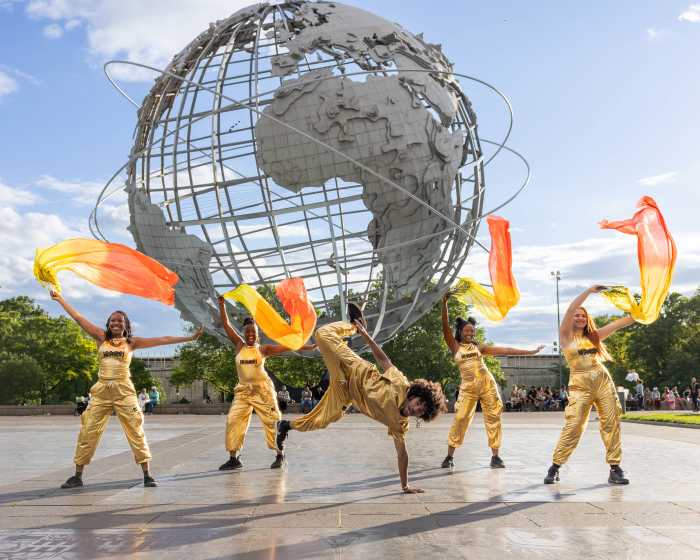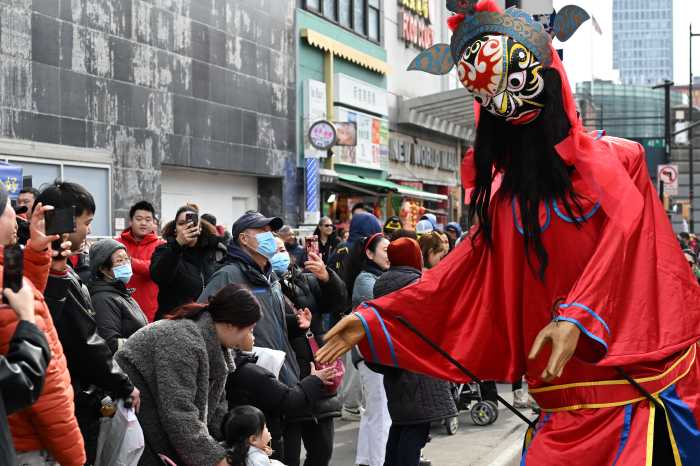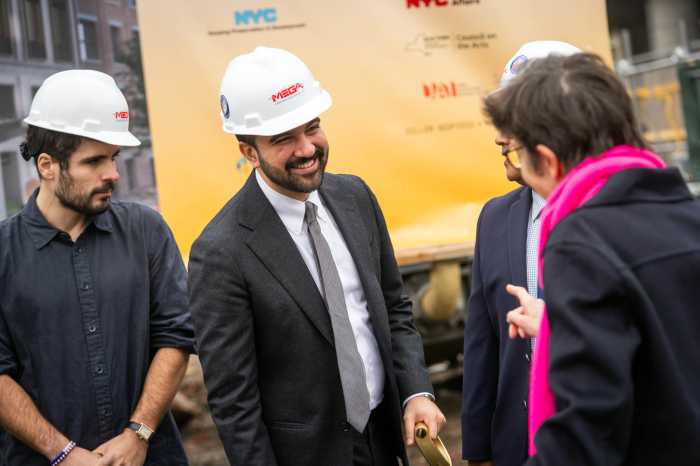When playwright Christina Quintana began volunteering at a Manhattan homeless shelter back in 2013, she knew she needed to write about it. Her interactions with the men and women of The Friends Shelter at 15 Rutherford Pl. translated themselves into “Evensong,” Quintana’s new play that unpacks the trials of homelessness in New York City.
The play, directed by David Mendizábal, made its world premiere at Astoria Performing Arts Center (APAC) on Nov. 3, and performances run through Nov. 19. Tickets can be purchased online at www.apacny.org, or at the box office half an hour prior to performances.
APAC’s artistic director and Astoria resident Dev Bondarin is ecstatic to be kicking off the center’s 16th season with such a powerful piece. “This show is emblematic of the kind of theater we want to be producing in Astoria and New York City,” Bondarin said. “It’s something that feels close to home, but it’s also something new that, to quote Shakespeare, ‘holds a mirror up to nature,’ asking us, ‘Are we doing the best we can do?’”
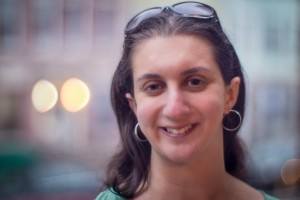
This next season for APAC in particular focuses on topical social issues, with “Evensong” taking the lead, then a revival of “Raisin,” a musical adaptation of Lorraine Hansberry’s iconic play, “Raisin in the Sun,” opening in the spring. Considering this month’s presidential election and our country’s constant change, Bondarin believes the timeliness of these shows is crucial: “In terms of our social climate, I think theater folk in the city can join the conversation by producing work that is relevant, in ways that are really important.” And “Evensong” gives us just that.
The 90-minute play follows the difficult life of Mexican-American Teofilo “Teo” Aguilar, a young, gay, homeless man in New York City. Teo struggles to make ends meet working as a bank teller, while also searching for companionship in a world filled with loneliness. A story of human connection, “Evensong” sheds light on the shelter system and the lesser-known working homeless population.
“I don’t think a lot of people realize that there are so many people in the shelter who actually get up and go to work each day, trying to make it work,” Quintana said. “Teo is like so many people you find in the shelters who actually have jobs, but they don’t have a support system.”
To prepare for such a complex role, Daniel Prado, who plays Teo, felt that research was necessary, and turned to the local neighborhood for inspiration.
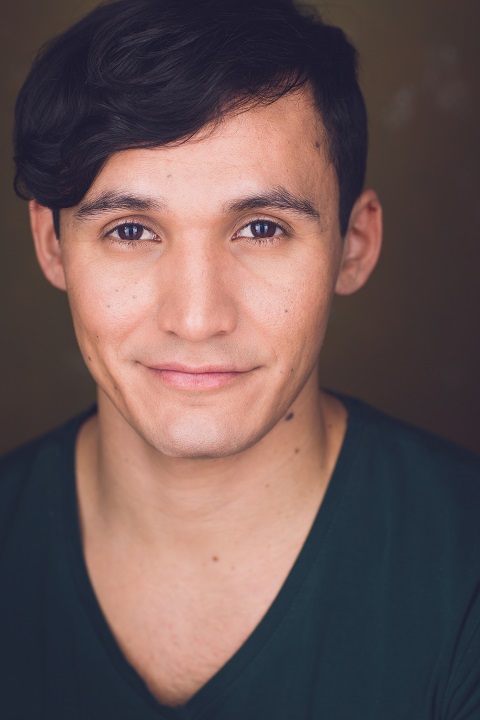
“I know that there are people who have jobs who also live in shelters, but I never understood the circumstances, so I reached out to a community near Astoria,” the young actor said. “There were some people I talked to who told me about how a lot of them are very positive, but there are also a lot who deal with emotional issues when in the shelter. I think it’s all about being positive.”
Prado illustrates Teo’s character as “confident and kind of edgy,” Prado explained. “He has issues underneath that he’s not letting out. I think a lot of what this character is dealing with is coming to terms with being homeless, and how opening up to people is a big part of getting through it.”
Teo, as well as other characters in the play, is an amalgamation of individuals Quintana came across while volunteering at the shelter. The experiences her characters go through echo those of real people, and even some of her own.
In terms of her character’s love life, Quintana recalls being hit on by a young homeless woman at the shelter.
“I was with my friends later, and they asked if I would ever go out with her,” the Manhattan-based writer said. “It kind of made me think, why not? I feel like it’s kind of the same thing when you meet a stranger in a bar or on OkCupid.”
It’s these little details that bring relatable humanity to her characters’ lives. Teo struggles to find love in a place where survival is the first priority.
The play’s simple yet provocative title, “Evensong,” comes from an Episcopalian tradition. Quintana wanted a title that encompassed a “chorus of the city.” “Evensong” is the name of an evening prayer service, traditionally done through song. To Quintana, it symbolizes a coming together of humanity, of society helping one another. The show will use choral music throughout, along with other fantastical elements only possible in a theatrical space.
The show promises to not only entertain its audience, but also offer something larger. Quintana and Bondarin share the vision that viewers will leave their seats with a greater sense of the world around them.
“This play takes you inside the inner perspective of a character [Teo] and his day-to-day life in New York City,” Bondarin said. “You get to experience what he experiences in a way that makes the topic much more relatable. It allows us to understand the issue better and understand how we look at other people — hopefully with a little more sensitivity and humility, because we could find ourselves in the same situation tomorrow.”
This is not the first time Quintana and Bondarin have worked together, and when Bondarin read the “Evensong” script for the first time, she knew it was meant for APAC.
“This is a really good play for us from a thematic point of view, but it’s also really good for our space,” Bondarin said.
The playwright shared the sentiment, recalling that the minute she saw the theater space, it just “felt right.” Just as the play and the space work together in perfect harmony, so do the human connections of Quintana’s story, producing the perfect “Evensong” for their audience.

